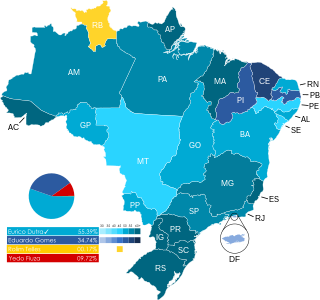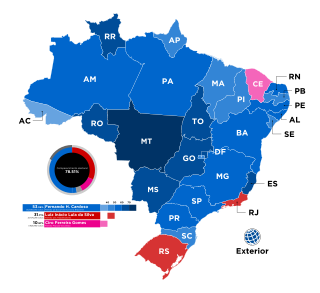
Elections in Guyana take place within the framework of a multi-party representative democracy and a presidential system. The National Assembly is directly elected, with the nominee of the party or alliance that receives the most votes becoming President.

Presidential elections were held in Chile on February 1, 1942. The result was a victory for Juan Antonio Ríos of the Radical Party, who received 56% of the vote.

The Liberal Party, commonly known as the Blue Party, was a political party in Paraguay, ruling the country for most of the period between 1904 and 1940.

Folketing elections were held in Denmark on 28 October 1947, except in the Faroe Islands where they were held on 18 February 1948. The Social Democratic Party remained the largest in the Folketing, with 57 of the 150 seats. Voter turnout was 86% in Denmark proper and 60% in the Faroes.

General elections were held in Brazil on 2 December 1945, the first since the establishment of Getúlio Vargas' Estado Novo. The presidential elections were won by Eurico Gaspar Dutra of the Social Democratic Party (PSD), whilst the PSD also won a majority of seats in both the Chamber of Deputies and the Senate. Voter turnout was 83% in the presidential election, 81% in the Chamber elections and 73% in the Senate elections.

General elections were held in Brazil on 4 October 1998 to elect the President, National Congress and state governorships. If no candidate in the presidential election received more than 50% of the vote in the first round, a second-round runoff would have been held on 25 October. The election saw voting machines used for the first time in Brazilian history.

General elections were held in Brazil on 3 October 1950. The presidential elections were won by Getúlio Vargas of the Brazilian Labour Party, whilst the Social Democratic Party remained the largest party in both the Chamber of Deputies and the Senate, although they lost their majority in the former. Voter turnout was 72.1% in the presidential election, 72.0% in the Chamber elections and 77.7% in the Senate elections.

Early presidential elections were held in Brazil on 13 April 1919, following the death of Rodrigues Alves, who had been elected the previous year. The result was a victory for Epitácio Pessoa of the Paraíba Republican Party, who received 71% of the vote.

Presidential and vice presidential elections were held in Brazil on 1 March 1922. The presidential election resulted in a victory for Artur Bernardes of the Mineiro Republican Party, who received 56% of the vote.

General elections were held in Brazil on 1 March 1930. In the presidential elections the result was a victory for Júlio Prestes of the Paulista Republican Party, who received 58% of the vote.

Parliamentary elections were held in Brazil on 3 October 1954. The Social Democratic Party remained the largest party in both the Chamber of Deputies and the Senate. Voter turnout was 65.5%.

Presidential elections were held in Brazil on 3 October 1960. Jânio Quadros of the National Labour Party (PTN), helming a coalition of the PTN, the National Democratic Union and the Christian Democratic Party, won a sweeping victory, taking 48.3% of the vote. Voter turnout was 81%.

Parliamentary elections were held in Brazil on 15 November 1966. They were the first elections held after a military coup in 1964. In 1965 the military government of President Humberto de Alencar Castelo Branco dissolved all existing parties, and enacted a new electoral law that effectively limited the number of parties to two — the pro-government National Renewal Alliance (ARENA) and the opposition Brazilian Democratic Movement.

Parliamentary elections were held in Brazil on 15 November 1970. The result was a victory for the National Renewal Alliance Party, which won 223 of the 310 seats in the Chamber of Deputies and 40 of the 46 seats in the Senate. Voter turnout was 77% in the Chamber of Deputies election and 78% in the Senate election.

Parliamentary elections were held in Brazil on 15 November 1978. The pro-government National Renewal Alliance Party (ARENA) won 231 of the 420 seats in the Chamber of Deputies and 15 of the 23 seats in the Senate. Voter turnout was 82%.

Parliamentary elections were held in Brazil on 15 November 1982. The elections were conducted under the Military dictatorship in Brazil. Massive popular street demonstrations led the military dictatorship to stage the elections.

Parliamentary elections were held in Brazil on 15 November 1986. The Brazilian Democratic Movement Party won 260 of the 487 seats in the Chamber of Deputies and 38 of the 49 seats in the Senate. The members of both chambers elected in this election, together with the Senators elected in 1982 came together to form a Constitutional Assembly during 1987 and 1988. The Assembly produced a new constitution, which was promulgated on 5 October 1988.
Parliamentary elections were held in Romania on 28 March 1948. They were the first elections held under communist rule; the communist-dominated parliament had declared Romania a people's republic after King Michael was forced to abdicate in December 1947.
Parliamentary elections were held in Colombia on 16 March 1947 to elect the Senate and Chamber of Representatives, the first occasion on which the Senate was directly elected. The result was a victory for the Liberal Party, which won 73 of the 131 seats in the Chamber.

Events in the year 1947 in Brazil.













